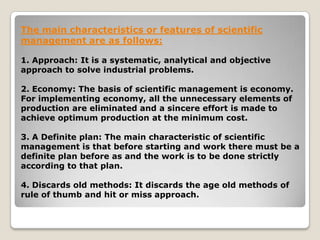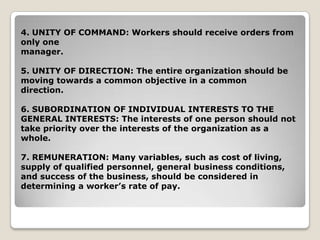Management
- 1. Management By Mr. Pathan A.B. Lecturer, MGM`s Polytechnic, Aurangabad
- 2. 1. Scientific Management by F W Taylor 2. Principles of Management by Henry Fayol
- 3. Scientific Management By F W Taylor Scientific management also called Taylorism, it was a theory of management that analyzed and synthesized workflows. Its main objective was improving economic efficiency. It was one of the earliest attempts to apply science to the engineering of processes and to management.
- 4. The main characteristics or features of scientific management are as follows: 1. Approach: It is a systematic, analytical and objective approach to solve industrial problems. 2. Economy: The basis of scientific management is economy. For implementing economy, all the unnecessary elements of production are eliminated and a sincere effort is made to achieve optimum production at the minimum cost. 3. A Definite plan: The main characteristic of scientific management is that before starting and work there must be a definite plan before as and the work is to be done strictly according to that plan. 4. Discards old methods: It discards the age old methods of rule of thumb and hit or miss approach.
- 5. 5. Techniques: It implies scientific techniques in methods of work, recruitment, selection and training of workers. 6. Attempts: It attempts to develop each man to his greatest efficiency and prosperities. 7. Method: It attempts to discover the best method of doing a work at the cheapest cost. 8. A definite Aim: It is another main characteristic of scientific management. Scientific management is the process of organizing, directing, conducting and controlling human activities. Hence there must be a definite aim before the managers, so that the human activities be organized directed conducted and controlled for achieving that aim or aims.
- 6. 9. changes in attitude: It involves a complete change in the mental attitude of workers as well as the management. 10. A Set of Rules: There must be a set of rules in accordance with the laid plan so that the objectives can be achieved. According to F.W. Taylor, It is no single element but rather the whole combination that constitutes the scientific management
- 7. Henri Fayol (Istanbul, 29 July 1841 – Paris, 19 November 1925) He was a French Mining Engineer and director of mines who developed a general theory of business administration. He and his colleagues developed this theory independently of scientific management. He was one of the most influential contributors to modern concepts of management.
- 8. 14 Principles of Management 1. DIVISION OF WORK: Work should be divided among individuals and groups to ensure that effort and attention are focused on special portions of the task. Fayol presented work specialization as the best way to use the human resources of the organization. 2. AUTHORITY: The concepts of Authority and responsibility are closely related. Authority was defined by Fayol as the right to give orders and the power to exact obedience. Responsibility involves being accountable, and is therefore naturally associated with authority. Whoever assumes authority also assumes responsibility. 3. DISCIPLINE: A successful organization requires the common effort of workers. Penalties should be applied judiciously to encourage this common effort.
- 9. 4. UNITY OF COMMAND: Workers should receive orders from only one manager. 5. UNITY OF DIRECTION: The entire organization should be moving towards a common objective in a common direction. 6. SUBORDINATION OF INDIVIDUAL INTERESTS TO THE GENERAL INTERESTS: The interests of one person should not take priority over the interests of the organization as a whole. 7. REMUNERATION: Many variables, such as cost of living, supply of qualified personnel, general business conditions, and success of the business, should be considered in determining a worker’s rate of pay.
- 10. 8. CENTRALIZATION: Fayol defined centralization as lowering the importance of the subordinate role. Decentralization is increasing the importance. The degree to which centralization or decentralization should be adopted depends on the specific organization in which the manager is working. 9. SCALAR CHAIN: Managers in hierarchies are part of a chain like authority scale. Each manager, from the first line supervisor to the president, possess certain amounts of authority. The President possesses the most authority; the first line supervisor the least. Lower level managers should always keep upper level managers informed of their work activities. The existence of a scalar chain and adherence to it are necessary if the organization is to be successful. 10. ORDER: For the sake of efficiency and coordination, all materials and people related to a specific kind of work should be treated as equally as possible
- 11. 11. EQUITY: All employees should be treated as equally as possible. 12. STABILITY OF TENURE OF PERSONNEL: Retaining productive employees should always be a high priority of management. Recruitment and Selection Costs, as well as increased product-reject rates are usually associated with hiring new workers. 13. INITIATIVE: Management should take steps to encourage worker initiative, which is defined as new or additional work activity undertaken through self direction. 14. ESPIRIT DE CORPS: Management should encourage harmony and general good feelings among employees. Team spirit helps develop an atmosphere of mutual trust and understanding











